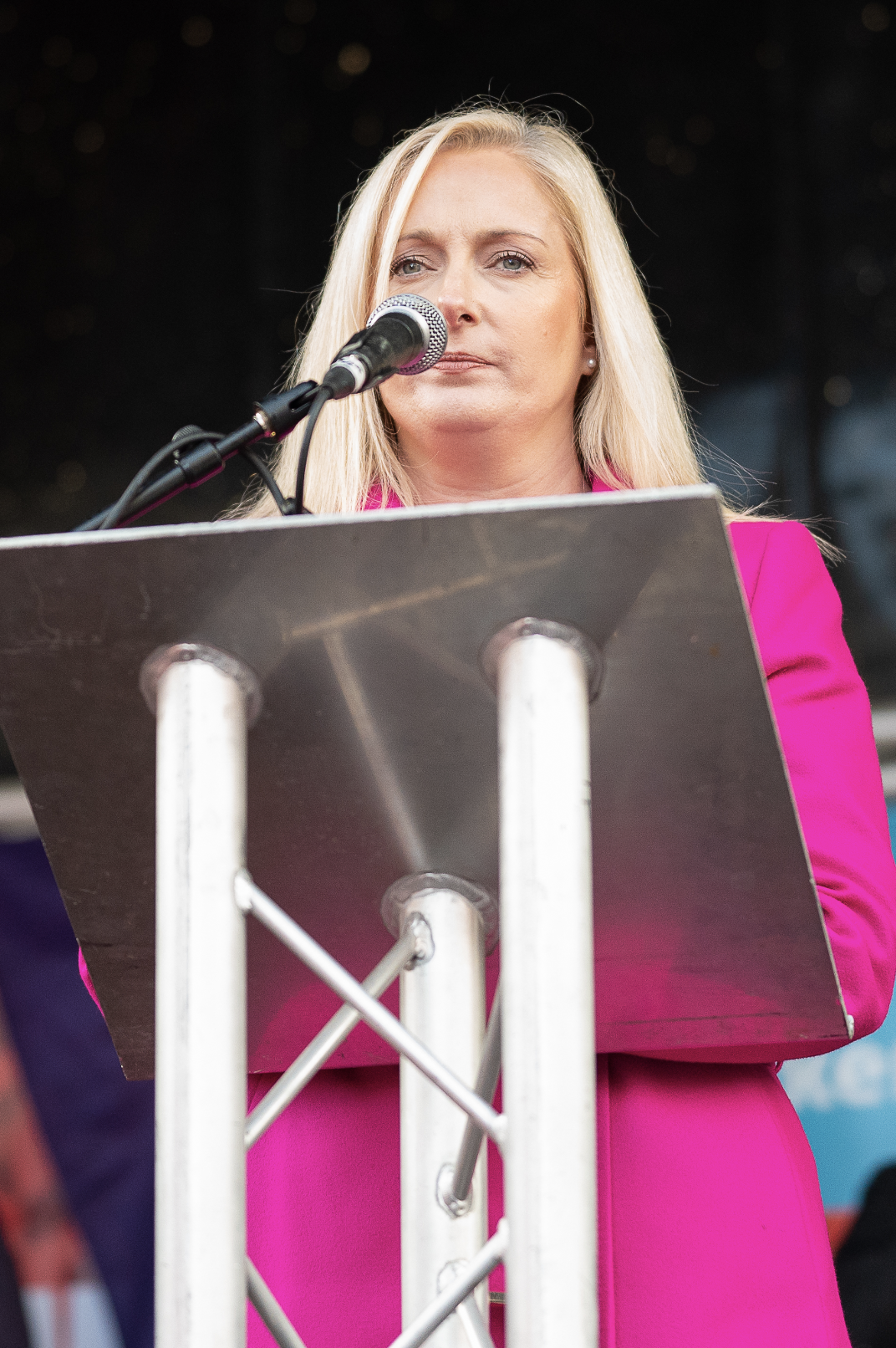Pay Campaign in NI:
‘A plan for Northern Ireland’
SoR’s national officer for NI , Cora Regan gives an update looking ahead to 2024
Cora Regan, Society of Radiographers national officer for NI
Cora Regan, Society of Radiographers national officer for NI
Can you give us an update on the Pay Campaign in Northern Ireland?
Radiography professionals in Northern Ireland have had no pay offer for '23-24.
We had a previous issue with the pay parity - we were out of pay parity with the rest of the UK back in 2019. Coincidentally, at that time, the Northern Ireland Assembly was also in a state of collapse and had been collapsed for three years at that point. Healthcare workers amongst others were taking strike action at that time, and a financial package was offered to return to the assembly. Part of that agreement was that healthcare workers in Northern Ireland would be kept at pay parity alongside our English colleagues.
But once the assembly collapsed here again in 2022, we were told that pay parity could no longer be guaranteed.
Our colleagues in England were offered a 5 per cent pay increase for '23/24 back in June, but healthcare workers in England are in a pay dispute because it’s not enough - we haven't even been offered that.
The situation in Northern Ireland is that not only are we the lowest paid across the UK, but geographically we lie on the same island as the Republic of Ireland, where radiographers typically receive higher pay. Realistically a basic grade radiographer or newly qualified, band five equivalent in the Republic of Ireland is earning about £8-9,000 more per year than somebody in Northern Ireland.
The border areas particularly are at extreme risk of losing staff and, in turn, the complete collapse of services.
This has always been the case, but it’s happened a lot more quickly in the last couple of years.
What are the workforce issues impacting NI?
In terms of workforce, the national average vacancy rate for radiography is around 12 per cent however, for some trusts in Northern Ireland vacancy rates are as high as 25 per cent.
We have been massively underfunded in terms of capital equipment, so the likes of MR scanners and CT scanners. Up until the last six months, we had scanners that were 20 years old-plus - the average life from a quality perspective is about five years at the most.
In terms of the services that are delivered, it is quite dire in Northern Ireland.
In terms of waiting lists for services, we have a population the size of Greater Manchester, so you're talking about 1.8-1.9 million people in Northern Ireland. As it stands, we have more than 400,000 people on a waiting list for a consultation - about a quarter of the population sitting on a waiting list.
For the likes of hip surgery, waiting lists are five to 10 years - if you're over the age of 70, which is generally the demographic for somebody having a hip replacement, you will never get it because your lifespan is deemed to be shorter than the waiting time for surgery, which is absolutely ludicrous.
Cora (far right) joined the picket lines during strike action in NI last year
Cora (far right) joined the picket lines during strike action in NI last year
What would you like to see happen in NI in 2024?
I hope that the reform of funding does go ahead - the acknowledgment that we do need a sustainable financial package and a long term budget. Because the budgets in Northern Ireland go from year-to-year and sometimes go from financial quarter to financial quarter. There is no forward planning. There's no planning ahead.
What I would like is at least a three or five-year plan. We need to know what we're going to get in terms of undergraduates, and a commitment to the likes of ‘earn as you learn’ apprenticeship schemes, which aren't adopted in Northern Ireland because of the funding model and where the funding sits. We don't have apprentices within healthcare in Northern Ireland, which is completely different from England where it actually has been introduced and where it works well, alleviating some of those workforce pressures.
It won't solve our issues in isolation, but it will allow career progression for our staff, and will allow them to progress through to be able to be part of that transformation, to be able to build on advanced practice, to be able to share the workload of consulting colleagues to free them up to do more complex work, to actually get more value for money and to be able to provide services that they're proud of.
Are you optimistic for the future of radiography in NI?
There's something that we do have in spades in Northern Ireland, despite everything that's gone on both in the past and the present - we do have hope.
We hope that the political leaders do take responsibility to sort out those finances, to be able to put a plan in place, and to be able to actually furnish some of those plans that are already there.
There's a lot of work that could be rolled out if they allocate funding to it. It's about our elected politicians getting back in and doing their jobs and actually taking financial responsibility for the citizens of this ‘wee place,’ as we call it, because they need to do that.
There needs to be a long term sustainable funding plan in place for our staff to be able to deliver their services.
Can you give us an update on the holiday pay claims?
It's the Supreme Court judgement that was published on 4 October 2023, where there was a case called Agnew vs the PSNI. Agnew was supported by the Northern Ireland Public Service Union to take the case whereby employers had been unlawfully deducting holiday pay.
So, when the working time regulations came into place, the ruling was that everybody while they're off on holiday should be paid as if they're in work. Now, what our members do quite often is they regularly work above their contractual hours - for example additional time for part time staff, or full time staff who regularly work overtime hours. Those staff are paid for what they work in terms of overtime, unsocial hours, additional hours, on call allowance, and standby allowance. But when they're off on holiday, it's a flat rate. That has been deemed to be illegal.
The cases in England, Scotland and Wales were settled a few years ago. What the government in England did was put a cap on the settlement, so that any resolution could only go back two years. That's all been sorted England, Scotland and Wales. But in Northern Ireland it wasn't because the Agnew judgement was based in Northern Ireland.
The Stormont assembly didn't put any backstop on it either, and the unlawful deduction of holiday pay still stands for all staff who've lodged cases with the tribunal.
That judgement also meant backpay could be looked for back to the introduction of the working and time regulations, which was 1996, but in Northern Ireland the regulations were only implemented in 1998 but they should have been in place since 1996. So they actually have a claim for back pay to 1996, potentially .
You're talking massive amounts of money.
We have had an industrial tribunal case lodged since 2019, with over 800 members in Northern Ireland who are raising that they have had unlawful deductions in their pay.
We're looking at it with legal counsel and forensic accountants to see if they can come up with a formula for how people will receive back pay, a way of ensuring that it's fair for everybody.
It's all very up in the air, but in December I had a meeting with trade union leaders in Northern Ireland. Everybody's very committed to getting the work done and trying to get the resolution on paper.
But we will be the leading light as to what the back pay formula will look like.
Find out more...
Cora Regan is SoR’s national officer for Northern Ireland. She has been a diagnostic radiographer since graduating with a BSc Hons in radiography in 1998, starting her career in Musgrave Park Hospital in Belfast, where she first became IR rep for the Society of Radiographers.
In 2018, she became observer to UK Council of the SoR and represented Northern Ireland as council member from 2018 to 2019.
She has been national officer for NI with SoR since February 2023.
Find out more about the Agnew pay judgement here.




